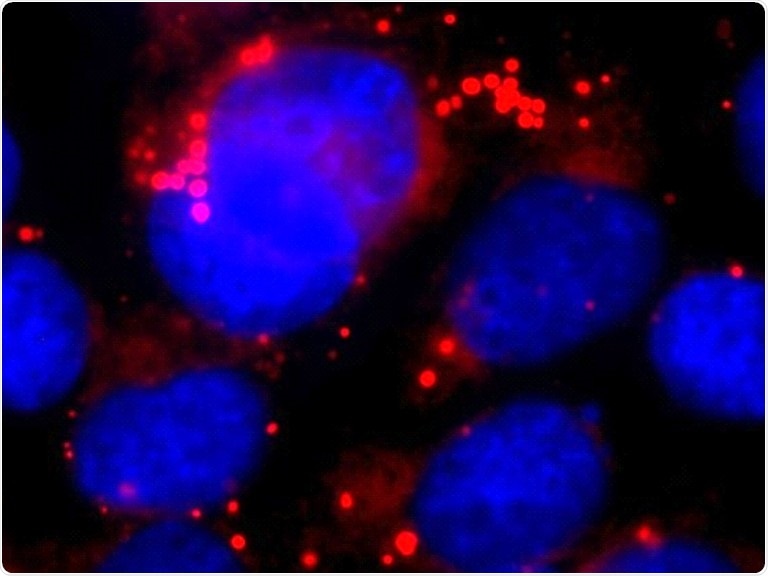
After inhibition of secretase, the examined brain cells, the astrocytes (their cell nucleus is stained blue), accumulate large quantities of lipid droplets (red). These disrupt the normal cell function. Image Credit: AG Walter/University of Bonn.
Named gamma-secretase, the shredder is regarded as a potential target for drugs against Alzheimer’s disease and cancer. But the outcomes imply that such agents are likely to have long-range impacts that must be observed closely. The study was recently published in the Life Science Alliance journal.
A fatty film, known as the plasma membrane, surrounds each cell in the body. This membrane also contains various proteins that cover the membrane from the outer side to the inner side and function as sensors for the cell.
Upon encountering specific molecules on the outer side, they produce a signal on the inner side of the membrane, thus controlling specific reactions inside the cell. Other membrane proteins are capable of transporting particular substances into the cell.
Gamma-secretase has a significant role to play in the discharge of membrane-anchored signaling proteins. However, it also acts as a “cleaning specialist” for membrane proteins that have been discarded, it disintegrates the proteins inside the cell membrane for additional disposal.
Considering this function, the gamma-secretase has been the focus of Alzheimer’s studies for nearly 20 years: several brain cells comprise a protein known as APP in their membrane.
When APP is broken down by gamma-secretase, one of the fragments is discharged into the brain fluid, that is, the so-called Abeta peptide.
It is this peptide that happens to be the key constituent of the plaques identified in the impaired brain areas of patients suffering from Alzheimer’s disease.
Originally, it was therefore hoped that the inhibition of gamma-secretase could slow down Alzheimer’s disease. Unfortunately, that hasn’t proved successful so far.”
Dr Jochen Walter, Professor, University of Bonn
Waste in the membrane
Gamma-secretase is presently known to play significant roles in cellular function. If it fails, the cellular membranes will slowly fill up with waste.
This may, for example, damage the effective uptake of particular molecules inside the cells. The present research has revealed that such a failure can lead to serious consequences.
The APP also has a major role to play here: “When we inhibit gamma-secretase in cell cultures, APP accumulates in the membranes,” explained Walter’s colleague Dr. Esteban Gutierrez. “This, in turn, hinders the absorption of so-called lipoproteins from the environment.”
This mechanism activates a deadly process. Lipoproteins can be described as particles of proteins and fat-like molecules, that are lipids. Even if a few of these lipoproteins enter the cell, the cell would suspect a lipid deficiency. To rectify this, the cell boosts its own lipid synthesis.
According to Gutierrez, “We have shown that inhibition of the causes a strong activation of a central regulator of lipid synthesis called LXR.”
The lipids are partly transported from the cell, but owing to the disturbed uptake of lipoproteins, the cell does not receive any feedback that this measure was actually effective and goes on to produce more numbers of lipids.
This implies that various fat droplets build up within the cell over a period of time. In extreme quantities, this causes adiposis in the interior of the cell, disrupting major cellular functions.
Other studies have already shown that a disruption of the lipid metabolism in the brain can also contribute to the development of Alzheimer’s disease, our study points to a mechanism by which this could happen.”
Dr Jochen Walter, Professor, University of Bonn
Therefore, the suppression of gamma-secretase may have a reverse effect that one would anticipate from this measure.
Inhibition of secretase hinders the division of cancer cells
But it is more encouraging in another context, that is, the fight against cancer. The proteins that replicate cell division are present in the cell membrane.
If gamma-secretase is deactivated in tumor cells, such proteins are not released from the membrane anymore, and hence, the tumor cells can no longer replicate as rapidly.
In this case, too, the treatment causes side effects, As long as they are mainly confined to cancer cells, this is probably not a major problem; nevertheless, one should keep an eye on them.”
Dr Jochen Walter, Professor, University of Bonn
Source:
Journal reference:
Gutierrez, E., et al. (2020) Importance of γ-secretase in the regulation of liver X receptor and cellular lipid metabolism. Life Science Alliance. doi.org/10.26508/lsa.201900521.